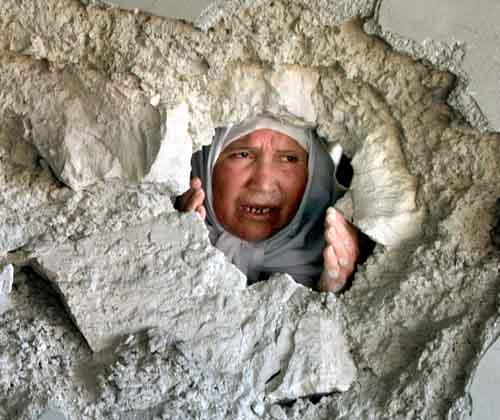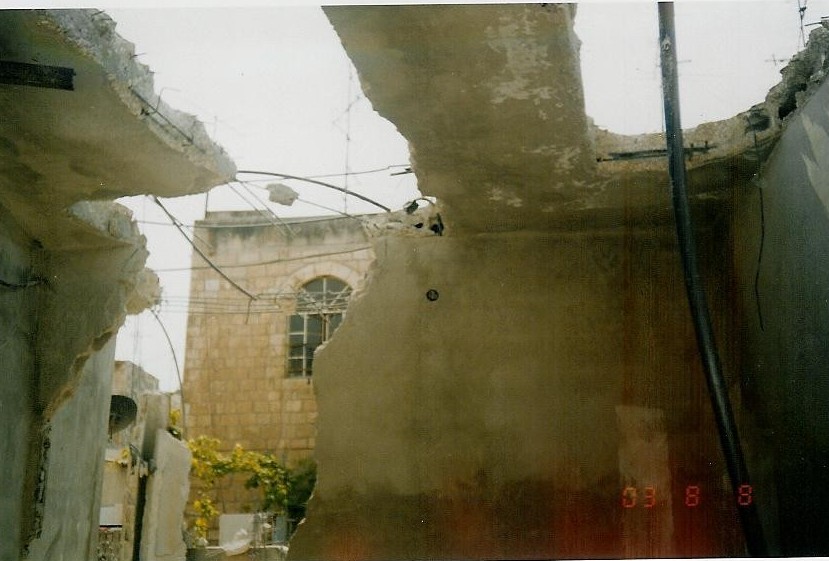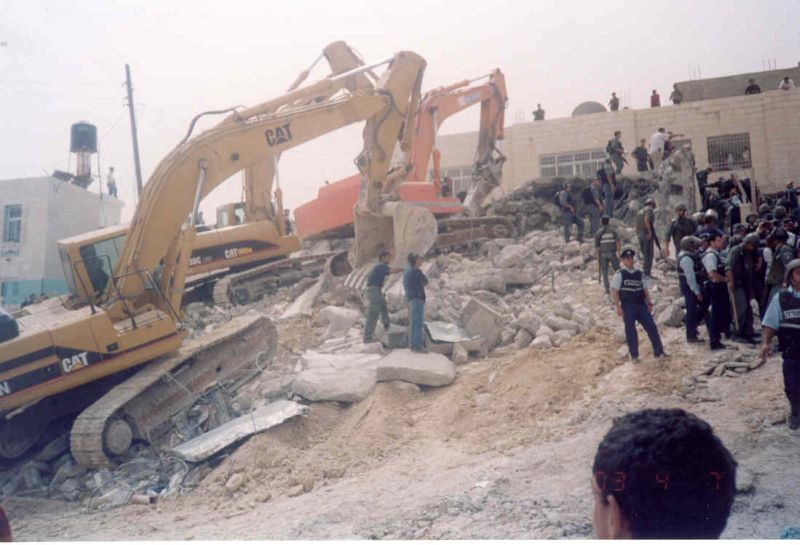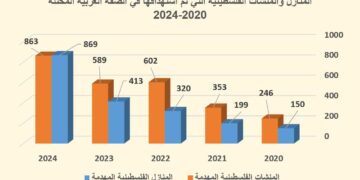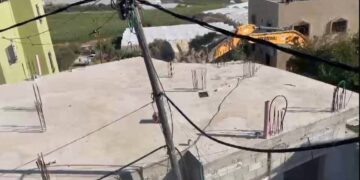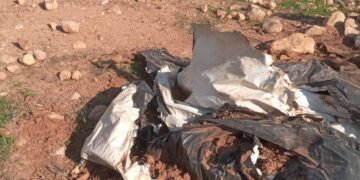Introduction
'' Building is Prohibited but Demolition is Allowed '' is not just a slogan held dearly by the Jerusalem Municipality, it is also a daily-executed program.
The occupation of Jerusalem was only the first step in the Israelization of the Holy City of Jerusalem which is the ultimate goal of successive Israeli governments. To reach such a goal, Israeli governments utilized quite many tools, including the demographic change through land confiscation (Palestinian Jerusalemites are prevented from using 86% of their lands) and through the establishment of settlements (16 settlements housing 200,000 Israeli settlers) in East Jerusalem). Not to mention the Israeli rules and regulations against Palestinian Jerusalemites as well as the obstacles and impediments in the face of Palestinian building.
Other tools used to change the demography of the city include house demolition, huge fines, and jail sentences for Jerusalemites under the pretext of building without a permit as well as using large army forces during house searches and arrests.
A new tool
Most recently, a new tool has been created by the Municipality of the occupied city to keep the demographic balance at 74% Jews and 26% Palestinians. This new tool is resembled in the confiscation of building equipment. The Jerusalem Municipality had previously taken a number of steps as a prelude to institutionalize this new tool. Such steps include:
- A threat by Shalom Goldestien, the consultant of the Municipality head, on may 22nd, 2001, that building materials will not be allowed to be delivered to Palestinians without the existence of an Israeli permit.
- A news item appeared in an Israeli weekly magazine indicating that the Municipality intended to organize inspection patrols to discover building ''violations'' in East Jerusalem.
- A decision was made by the Jerusalem Municipality to allocate NIS 200.000 for the purpose of capturing aerial pictures of East Jerusalem to make it easier to spot unauthorized Palestinian building.
- A decision was made by the Municipality during the 1999-2000 fiscal years to double the funds used for house demolition. If such budget was not enough, more funds would be provided.
- In early 2003, the Municipality went confiscated a car and a concrete mixer that belonged to Mr. Hamza Al Mughrabi as well as a concrete pump owned by Mr. Bahjat Al Nabali.
- In the second half of June 2003, the Israeli weekly newspaper ''Urushalime ''mentioned that the Municipality was studying a new idea in its efforts to combat unauthorized building. The idea consisted of allowing Municipality inspectors to confiscate engineering machines and equipment (such as trucks, tractors, concrete mixers, etc) used in building ''unauthorized'' houses. The idea consisted, also, of allowing the confiscation to take place under the protection and cooperation of the Israeli Border Police.
Confiscation campaign
The above-mentioned steps led to an intensified equipment confiscation campaign in October and November 2003 as Municipality inspectors confiscated concrete mixers and pumps, bulldozers, large hammers, cars as well as engineering equipment. The inspectors even let concrete mixers stand still in the hot weather, which led to the hardening of concrete. The victims of this new policy included most of concrete, transport and truck agencies in East Jerusalem such as those belonging to Mr. Akram Al Kiswani (concrete mixer and pump), Mr. Hamza Al Mughrabi (trucks, mixers and pumps), Mr. Yunis Al Shofati, Al Nabali Concrete Company, Abu Arqoob Construction Company in addition to Qandeel Concrete Company.
This confiscation campaign which took place in Jabel Al Mukaber, Sur Baher, Abu Dis, Wadi Qadoum, Al Tur and Beit Hanina, among other locations, was executed ruthlessly and obnoxiously by the Israeli border police despite the fact that legal permits were shown to them in some cases.
Additional steps
Moreover, the Municipality of occupied Jerusalem resorted to additional steps to curtail and prevent Palestinian building in East Jerusalem.
These steps include:
1. Doubling financial penalties and fines on ''violators''. These fines could reach hundreds of thousands of shekels.
2. Forcing ''violators'' to demolish their homes themselves. Otherwise, the Municipality will demolish the house and then bill the house owner the cost in addition to a considerable fine. The additional fine is calculated depending on the total surface area of the house and the number of days passed without the house being demolished by the owner.
3. Arresting craftsmen working at building sites.
Old city- A house destroyed in 2003 at the hands of its Palestinian owner under threat of heavy fine by the municipality of occupied Jerusalem, Photo courtesy of LRC
Anti Palestinian suggestions and recommendations
In February 2004, the Municipality of occupied Jerusalem produced a number of suggestions and recommendations to prevent the Palestinian building expansion. They include:
1. Increasing the number of building inspectors in East Jerusalem.
2. Using aerial photography periodically, and
3. Forming security teams whose sole mission is to prevent ''unauthorized'' building by the use of force.
Already established steps
The established Israeli policies aimed at impeding Palestinian building in East Jerusaleminclude:
1. Disapproving and/or not providing master plans that meet Palestinian natural growth needs.
2. Levying high costs fees for building permits which can take up to 3-5 years to be issued.
3. Putting the condition of having a land ownership deed (Tabo) for issuing the permit. This condition has led to the refusal of hundreds of housing permits as many Palestinians cannot get such a tabo. It's worth mentioning here that the Israeli High court over ruled this condition in 2002 in fear that it would have to be implemented in the west (Jewish) section of the Holy City.
4. The continuous land confiscation and zoning schemes which led to scarcity of lands, a great increase in land prices, apartment shortage as well as high rents.
Specialized Demolition squads
The Jerusalem Municipality uses two to four companies to demolish ''illegal'' Palestinian houses under heavy protection by the Israeli army, police, border police, Special Forces as well as the internal security services (Shin Bet). These companies use their own equipment as to speed up the operation. The Land Research Center has documented a number of cases in which the Israeli contractor had refused to stop the demolition despite the fact that the house owner has legal documents from the court stipulating stopping the demolishing. Such an action was the case of Mr. Imad Al Dabssh of Sur Bahir and Mr. Adnan Shaheen of Silwan whose houses were demolished in 2003 while having court orders effectively vetoing the demolishing process. See yearly report of House demolition in Jerusalem during 2003.
Demolition squads in full action n Jerusalem, Photos courtesy of LRC
Prepared by
The Land Research Center
LRC


